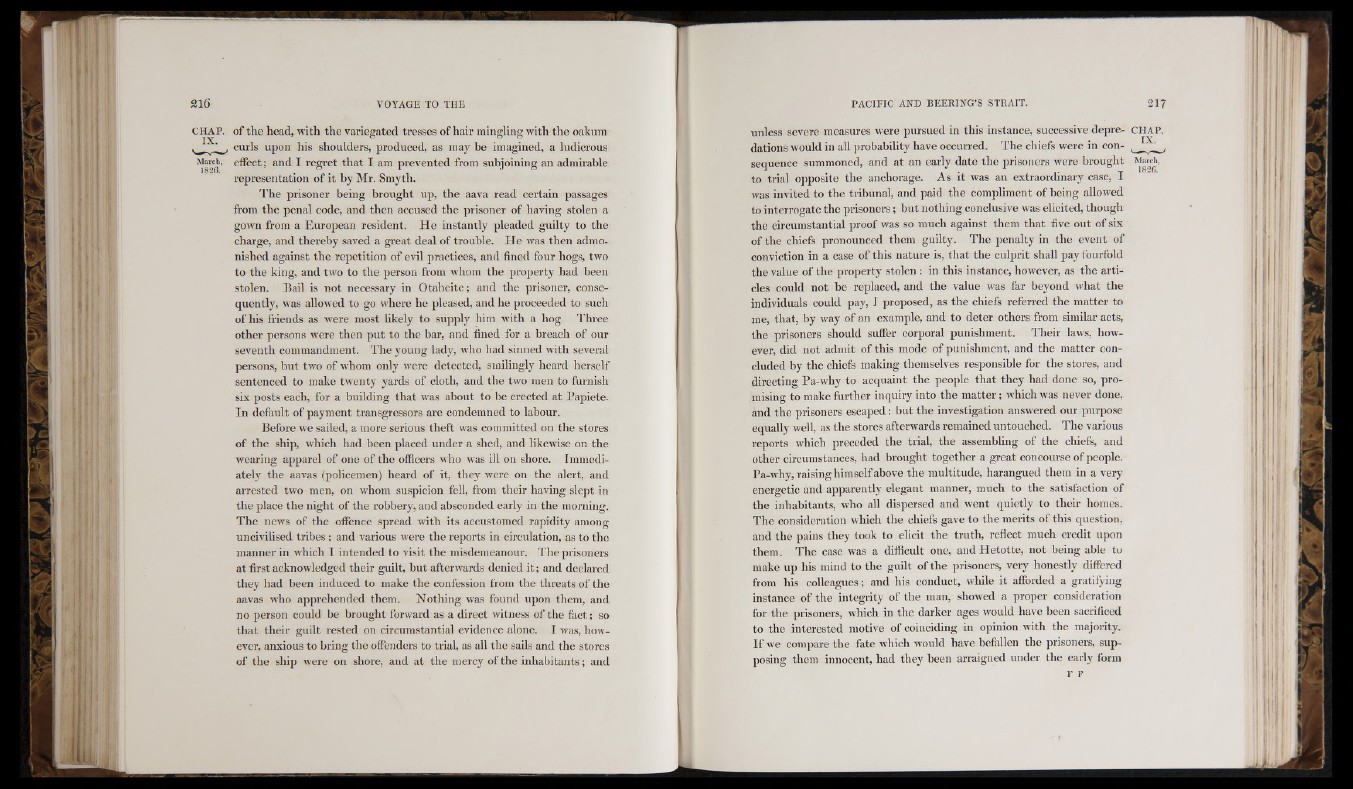
VOYAGE TO THE
CHAP. of the head, with the variegated tresses of hair mingling with the oakum
curls upon his shoulders, produced, as may be imagined, a ludicrous
effect; and I regret that I am prevented from subjoining an admirable
representation of it by Mr. Smyth.
The prisoner being brought up, the aava read certain passages
from the penal code, and then accused the prisoner of having stolen a
gown from a European resident. He instantly pleaded guilty to the
charge, and thereby saved a great deal of trouble. He was then admonished
against the repetition of evil practices, and fined four hogs, two
to the king, and two to the person from whom the property had been
stolen. Bail is not necessary in Otaheite ; and the prisoner, consequently,
was allowed to go where he pleased, and he proceeded to such
of his friends as were most likely to supply him with a hog. Three
other persons were then put to the bar, and fined for a breach of our
seventh commandment. The young lady, who had sinned with several
persons, but two of whom only were detected, smilingly heard herself
sentenced to make twenty yards of cloth, and the two men to furnish
six posts each, for a building that was ahout to be erected at Papiete.
In default of payment transgressors are condemned to labour.
Before we sailed, a more serious theft was committed on the stores
of the ship, which had been placed under a shed, and likewise on the
wearing apparel of one of the officers who was ill on shore. Immediately
the aavas (policemen) heard of it, they were on the alert, and
arrested two men, on whom suspicion fell, from their having slept in
the place the night of the robbery, and absconded early in the morning.
The news of the offence spread with its accustomed rapidity among
uncivilised tribes; and various were the reports in circulation, as to the
manner in which I intended to visit the misdemeanour. The prisoners
at first acknowledged their guilt, but afterwards denied it ; and declared
they had been induced to make the confession from the threats of the
aavas who apprehended them. Nothing was found upon them, and
no person could be brought forward as a direct witness of the fact; so
that their guilt rested on circumstantial evidence alone. I was, however,
anxious to bring the ofieuders to trial, as all the sails and the stores
of the ship were on shore, and at the mercy of the inhabitants; and
unless severe measures were pursued in this instance, successive depre- CHAP.
dations would in all probability have occurred. The chiefs were in con-
sequence summoned, and at an early date the prisoners were brought March,
to trial opposite the anchorage. As it was an extraordinary ease, I
was invited to the tribunal, and paid the compliment of being allowed
to interrogate the prisoners ; but nothing conclusive was elicited, though
the circumstantial proof was so much against them that five out of six
of the chiefs pronounced them guilty. The penalty in the event of
conviction in a case of this nature is, that the culprit shall pay fourfold
the value of the property stolen : in this instance, however, as the articles
could not be replaced, and the value was far beyond what the
individuals could pay, I proposed, as the chiefs referred the matter to
me, that, by way of an example, and to deter others from similar acts,
the prisoners should suffer corporal punishment. Their law's, however,
did not admit of this mode of punishment, and the matter concluded
by the chiefs making themselves responsible for the stores, and
directing Pa-why to acquaint the people that they had done so, promising
to make further inquiry into the matter ; which was never done,
and the prisoners escaped; but the investigation answered our purpose
equally well, as the stores afterwards remained untouched. The various
reports which preceded the trial, the assembling of the chiefs, and
other circumstances, had brought together a great concourse of people.
Pa-W’hy, r a i s in g himself above the multitude, harangued them in a very
energetic and apparently elegant manner, much to the satisfaction of
the inhabitants, who all dispersed and went quietly to their homes.
The consideration which the chiefs gave to the merits of this question,
and the pains they took to elicit the truth, reflect much credit upon
them. The case was a difficult one, and Hetotte, not being able to
make up his mind to the guilt of the prisoners, very honestly differed
from his colleagues; and his conduct, while it afforded a gratifying
instance of the integrity of the man, showed a proper consideration
for the prisoners, which in the darker ages would have been sacrificed
to the interested motive of coinciding in opinion with the majority.
I f we compare the fate which would have befallen the prisoners, supposing
them innocent, had they been arraigned under the early form